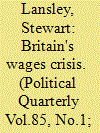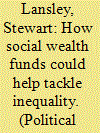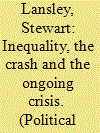| Srl | Item |
| 1 |
ID:
130943


|
|
|
|
|
| Publication |
2014.
|
| Summary/Abstract |
Is 'predistribution' as championed by Ed Miliband, or old fashioned 'redistribution' as adopted, if stealthily, by Labour from 1997, the best way to create greater equality? Some critics have argued that a strategy of predistribution-aimed at closing the income gap before the application of taxes and benefits-would not work and that it will be necessary to rely mainly on redistribution. This article examines the potential impact of weak and more radical predistribution-style measures on one of the key drivers of inequality-'wage compression'. It examines the potential of a mix of policies for raising the wage floor. It argues that reliance on traditional redistribution would face its own set of constraints and that creating a more equal distribution of the cake, before taxes and benefits, is a necessary condition for lowering the risk of continuing economic crisis.
|
|
|
|
|
|
|
|
|
|
|
|
|
|
|
|
| 2 |
ID:
141765


|
|
|
|
|
| Summary/Abstract |
This article examines the potential to tackle the roots of inequality by the introduction of one or more social wealth funds. Such funds would aim to capture some of the financial gains from the private ownership of capital—a principal driver of inequality—and use the proceeds for wider community benefit, such as investment in social infrastructure. In recent decades a number of countries have introduced a variant on such funds, mostly taking the form of state-owned sovereign wealth funds resourced through the exploitation of oil, and used for a diversity of economic purposes. In contrast, the UK has failed to take the opportunity to create such funds by, for example, reinvesting the revenue from the sales of public assets. So would it be possible to build one or more such collectively owned funds in the UK, and if so, how should they be financed? As well as funding social investment and anti-inequality programmes, could such a scheme also help finance a regular Citizen's Dividend payment or a Citizen's Income scheme?
|
|
|
|
|
|
|
|
|
|
|
|
|
|
|
|
| 3 |
ID:
118230


|
|
|
|
|
| Publication |
2012.
|
| Summary/Abstract |
The rise in inequality across many rich nations, but especially in the United Kingdom and the United States, was meant to lead to a bigger economic pie from which all would benefit. In fact, the increased concentration of income over the last three decades has led to more fragile and unstable economies making it a key cause of the 2008 Crash and today's lack of recovery. The evidence of the last 100 years is that models of capitalism that fail to share the proceeds of growth more evenly will eventually self-destruct. More equal societies have softer business cycles. In contrast, more unequal economies are associated with more extreme cycles-they have exaggerated booms, deeper falls and extended troughs. The scale of inequality is not just an issue about fairness and proportionality, it is therefore integral to economic health.
|
|
|
|
|
|
|
|
|
|
|
|
|
|
|
|